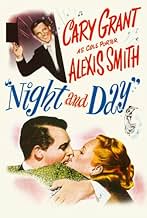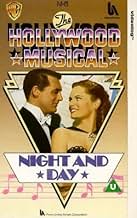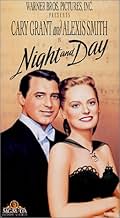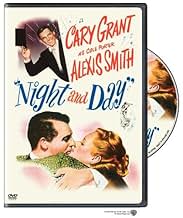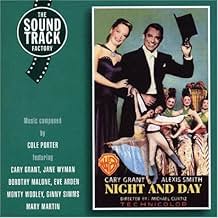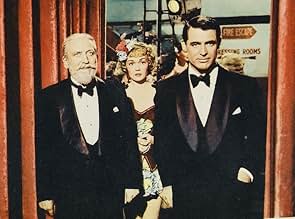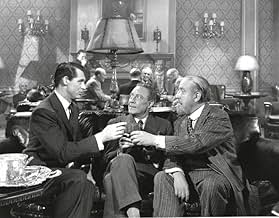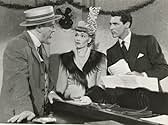VALUTAZIONE IMDb
6,1/10
3372
LA TUA VALUTAZIONE
Aggiungi una trama nella tua linguaA fictionalized biopic of composer Cole Porter from his days at Yale in the 1910s through the height of his success to the 1940s.A fictionalized biopic of composer Cole Porter from his days at Yale in the 1910s through the height of his success to the 1940s.A fictionalized biopic of composer Cole Porter from his days at Yale in the 1910s through the height of his success to the 1940s.
- Regia
- Sceneggiatura
- Star
- Candidato a 1 Oscar
- 2 candidature totali
Recensioni in evidenza
The only reason to watch this is:
COLE PORTER'S MUSIC COLE PORTER'S MUSIC
Hey.....I am a big fan of Cary Grant, but the only reason to watch this is:
COLE PORTER'S MUSIC COLE PORTER'S MUSIC
The musical productions are pretty, the musical arrangements are enjoyable. And the only reason to watch this is:
COLE PORTER'S MUSIC COLE PORTER'S MUSIC
Most of this story was completely fabricated because Hollywood just didn't deal with gay life then. It was verbotten...everything had to be glazed over. Hollywood made such an industry of Fictionalized Biographies that I must choose my favorite of these genre: the George Gershwin "story" called RHAPSODY IN BLUE.
So, if you haven't guessed yet what the only reason to watch this movie is...it's:
COLE PORTER'S MUSIC!!!
COLE PORTER'S MUSIC COLE PORTER'S MUSIC
Hey.....I am a big fan of Cary Grant, but the only reason to watch this is:
COLE PORTER'S MUSIC COLE PORTER'S MUSIC
The musical productions are pretty, the musical arrangements are enjoyable. And the only reason to watch this is:
COLE PORTER'S MUSIC COLE PORTER'S MUSIC
Most of this story was completely fabricated because Hollywood just didn't deal with gay life then. It was verbotten...everything had to be glazed over. Hollywood made such an industry of Fictionalized Biographies that I must choose my favorite of these genre: the George Gershwin "story" called RHAPSODY IN BLUE.
So, if you haven't guessed yet what the only reason to watch this movie is...it's:
COLE PORTER'S MUSIC!!!
Have you ever liked a film you knew wasn't all that great, yet one you simply enjoyed watching? That's the way I feel about "Night and Day," a musical bio with a large dose of fantasy mixed in on that great American songwriter Cole Porter. Perhaps it's the pleasure of watching Cary Grant having a ball playing the composer, and even singing a few tunes to boot. Or maybe it's the youthful Alexis Smith as a perfect "Mrs. Porter," coping with challenges as a famous songwriter's spouse. Certainly Monty Woolley is amusing as himself, playing a role he reportedly lived with the real-life composer. Then there's that honey-coated contralto Ginny Simms looking gorgeous in Technicolor and beautifully singing some of Porter's most expressive music and lyrics. In the supporting cast is a sprighty Jane Wyman (before she became laden with heavy dramatic roles) doing several comic-singing turns, and even a surprise bit from Eve Arden as a French cabaret star, "Gabrielle," performing an early, lesser-known show number. The screen has only one bio of this outstanding American songwriter, one who is respected by both popular and "serious" composer-peers, as well as by the critics and general public alike. Surely the scripters "did a job" on Porter's factual life, yet at least we have this elaborate effort, with a gung-ho cast that's ready & willing to give it their all. They all look like they're having a great time, and I for one have fun with them. Until a better Porter bio comes along, this one will have to do.
I haven't seen DE LOVELY, the new musical biopic about Cole Porter's life -- the movie trailer convinced me it would be as terrible as the reviews say it is. But Stephen Holden's pan in the N.Y. Times caused me to want to see NIGHT AND DAY again since he thought that for all its fraudulence, it caught something right about Porter's life and times. Having seen it recently for the first time since childhood, I can see what he meant. Evidently everything in it is a lie. Okay. Standard for Hollywood biopics.
The more important thing it gets wrong is the music, which for the most part is not handled well. In this period, Warner Bros. did not have talented singer/dancers under contract and it shows here. Ginny Simms is an accomplished if mechanical singer, Jane Wyman a passable one, but neither dances and neither dazzles. Mary Martin had talent and charm but not the looks nor the sparkle to come across well on film. When dancing is called for we get dull, pretentious ballroom/acrobatic routines from anonymous performers. This film needed the kind of musical talent MGM had under contract, and that lack of talent and zip makes for a musically mediocre film despite the fantastic Porter song catalog.
What the film got weirdly right was the casting of Cary Grant because either by his choice or director Michael Curtiz's design, Grant's withholding, enigmatic performance is intriguing, and does most of the work of spelling out 'the gay thing' for audiences in the know then and now. DE LOVELY may well be frank about the fact that Porter was gay, but gay audiences would have gotten the point in NIGHT AND DAY anyway. Lovely, elegant, chilly Alexis Smith does all the pursuing in the film, as do the other women, and yet Cole is charmingly evasive with all of them. They want him -- who wouldn't want to sleep with Cary Grant at the peak of his beauty? -- but he doesn't seem to care about anything but his music. Hmmmm. Where have we heard that before? Even when Linda/Alexis lands him, he's never really hers, he always seems to have his mind and heart elsewhere. There is absolutely no suggestion anywhere in this film that there was intense passion, emotion or love on his side of this relationship, which is unusual in this period. Rather their marriage seems to be a companionable one of mutual respect, which was apparently the case in real life. When Linda/Alexis gets fed up with being neglected in favor of Cole's work, we can also imagine that an endless supply of bellmen, sailors and chorus boys may have had something to do with it as well. The movie can't say this, but it leaves enough space and question marks for the audience to fill in the blanks. And we do.
Even at the end, with Porter being honored back at Yale with the (all male) glee club singing the glorious "Night and Day" and Linda walks in and she and Cole meet again on the brick patio in the moonlight, Grant doesn't kiss her except for a chaste peck on the cheek. Once again, as throughout the film, he is the passive object of her desire and he hardly seems to care. This performance as much as his work in the excellent NOTORIOUS suggests the coldness and misogyny that sometimes lurk in his screen persona. It's explicit in SUSPICION and NOTORIOUS, Hitchcock was exploring it there, but it's actually implicit in NIGHT AND DAY in every closeup where Grant looks simultaneously gorgeous and conflicted. How hard it must have been to be this beautiful and this uneasy about it.
I concur with those here who find the print currently on view on TCM as sub-par. A new DVD is out on NIGHT AND DAY and TCM would do well to show this in future. Meanwhile, feel free to check this picture out to see an example of screenwriters, a director and a star who work hard to suggest what they cannot actually say.
The more important thing it gets wrong is the music, which for the most part is not handled well. In this period, Warner Bros. did not have talented singer/dancers under contract and it shows here. Ginny Simms is an accomplished if mechanical singer, Jane Wyman a passable one, but neither dances and neither dazzles. Mary Martin had talent and charm but not the looks nor the sparkle to come across well on film. When dancing is called for we get dull, pretentious ballroom/acrobatic routines from anonymous performers. This film needed the kind of musical talent MGM had under contract, and that lack of talent and zip makes for a musically mediocre film despite the fantastic Porter song catalog.
What the film got weirdly right was the casting of Cary Grant because either by his choice or director Michael Curtiz's design, Grant's withholding, enigmatic performance is intriguing, and does most of the work of spelling out 'the gay thing' for audiences in the know then and now. DE LOVELY may well be frank about the fact that Porter was gay, but gay audiences would have gotten the point in NIGHT AND DAY anyway. Lovely, elegant, chilly Alexis Smith does all the pursuing in the film, as do the other women, and yet Cole is charmingly evasive with all of them. They want him -- who wouldn't want to sleep with Cary Grant at the peak of his beauty? -- but he doesn't seem to care about anything but his music. Hmmmm. Where have we heard that before? Even when Linda/Alexis lands him, he's never really hers, he always seems to have his mind and heart elsewhere. There is absolutely no suggestion anywhere in this film that there was intense passion, emotion or love on his side of this relationship, which is unusual in this period. Rather their marriage seems to be a companionable one of mutual respect, which was apparently the case in real life. When Linda/Alexis gets fed up with being neglected in favor of Cole's work, we can also imagine that an endless supply of bellmen, sailors and chorus boys may have had something to do with it as well. The movie can't say this, but it leaves enough space and question marks for the audience to fill in the blanks. And we do.
Even at the end, with Porter being honored back at Yale with the (all male) glee club singing the glorious "Night and Day" and Linda walks in and she and Cole meet again on the brick patio in the moonlight, Grant doesn't kiss her except for a chaste peck on the cheek. Once again, as throughout the film, he is the passive object of her desire and he hardly seems to care. This performance as much as his work in the excellent NOTORIOUS suggests the coldness and misogyny that sometimes lurk in his screen persona. It's explicit in SUSPICION and NOTORIOUS, Hitchcock was exploring it there, but it's actually implicit in NIGHT AND DAY in every closeup where Grant looks simultaneously gorgeous and conflicted. How hard it must have been to be this beautiful and this uneasy about it.
I concur with those here who find the print currently on view on TCM as sub-par. A new DVD is out on NIGHT AND DAY and TCM would do well to show this in future. Meanwhile, feel free to check this picture out to see an example of screenwriters, a director and a star who work hard to suggest what they cannot actually say.
Thanks to the TCM channel, we can easily view old classics like this. Although nicely shot in Technicolor, the print is just a shade pastel, and looks better with the TV's color cranked up just a little bit. The movie starts in 1914, with Porter at Yale and already writing songs, even though he was a law student. However, at Christmas break, after he told his mother that he wasn't going back, he was going to focus on writing music instead, 'Oh, I could be a lawyer, but not a very good one. When I look at a lawbook I think of a song. When I read a legal case, I hear a melody.' Like almost any biographical movie, certain parts are fictionalized, and many things have to be left out. But this movie gives us the pleasure of many Cole Porter classics and a glimpse into the man behind the songs. A good movie for anyone who is a fan of Porter's, or American musical history in general.
Cary Grant was 41/42 when this was filmed, so it is a bit of a stretch imagining him, in the beginning, as a college student. This movie came out the same year (1946) as 'Notorious', and one year before one of my favorite Cary Grant movies, where he plays an angel in 'The Bishop's Wife (1947).'
Cary Grant was 41/42 when this was filmed, so it is a bit of a stretch imagining him, in the beginning, as a college student. This movie came out the same year (1946) as 'Notorious', and one year before one of my favorite Cary Grant movies, where he plays an angel in 'The Bishop's Wife (1947).'
If you want a biography of Cole Porter you better go to the library, you won't find it here. This is a highly entertaining but strictly fictional version of his life--played by no less than Cary Grant, in his usual debonair style, perhaps just a shade understated so as to appear more like Porter. Whatever, he's still Cary Grant (playing himself in a minor key) and since the music is what makes this film tick, you'll forgive whatever liberties the scriptwriters have taken. It all looks wonderful in glowing technicolor.
Alexis Smith never was able to make a warm presence on the screen despite her talent and striking good looks. She seems even more remote here as the woman Porter woos and marries. Monty Woolley has a fine time playing himself. The musical moments are handled nicely by some talented people: Ginny Simms, Eve Arden, Jane Wyman and Mary Martin doing her "My Heart Belongs to Daddy" routine. All of the Porter standards are nicely done.
Interesting tidbit: Was Oscar nominated for "Best Scoring of a Musical" but lost to "The Jolson Story".
Relaxing entertainment. Just don't expect a truthful bio.
Alexis Smith never was able to make a warm presence on the screen despite her talent and striking good looks. She seems even more remote here as the woman Porter woos and marries. Monty Woolley has a fine time playing himself. The musical moments are handled nicely by some talented people: Ginny Simms, Eve Arden, Jane Wyman and Mary Martin doing her "My Heart Belongs to Daddy" routine. All of the Porter standards are nicely done.
Interesting tidbit: Was Oscar nominated for "Best Scoring of a Musical" but lost to "The Jolson Story".
Relaxing entertainment. Just don't expect a truthful bio.
Lo sapevi?
- QuizAfter attending the premiere of the film, Cole Porter supposedly remarked to his wife, Linda, "if I could survive that, I can survive anything."
- BlooperWhen in England, there are street performers singing "Rosalie". The accordion player's hands never press the keys; in fact, his right hand is static throughout the whole scene.
- Citazioni
Monty Woolley: Haven't you ever wanted to be alone?
Gracie Harris: Yes, but with somebody.
- ConnessioniEdited from Don't Fence Me In (1945)
- Colonne sonoreNight and Day
(1932) (uncredited)
Written by Cole Porter
Played during the opening credits and often in the score
Sung by Bill Days
Reprised by passengers on a train
I più visti
Accedi per valutare e creare un elenco di titoli salvati per ottenere consigli personalizzati
- How long is Night and Day?Powered by Alexa
Dettagli
Botteghino
- Budget
- 4.445.000 USD (previsto)
- Tempo di esecuzione2 ore 8 minuti
- Proporzioni
- 1.37 : 1
Contribuisci a questa pagina
Suggerisci una modifica o aggiungi i contenuti mancanti

Divario superiore
By what name was Notte e dì (1946) officially released in India in English?
Rispondi

